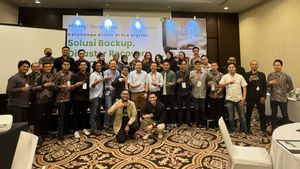JAKARTA - The National Cyber and Crypto Agency (BSSN) noted that there were 1.1 million cyber attacks targeting perpetrators in the financial services sector throughout 2022.
"The trend of cyber attacks or internet anomalies has increased dramatically. Last year we recorded 1.6 billion anomalies. Of the 1.6 billion are dominated by malware. In 2022, traffic attacks targeting financial sector players reached 1.1 million attacks with an average daily of 120,000", said Director of Cybersecurity and Crypto Finance, Trade and Tourism of BSSN Edit Prima in Jakarta, Thursday, November 24.
Of the 1.1 million attacks, he said, 57 percent of them were models of the Advanced Persistent Threat (APT) attack.
As it is called advanced or sophisticated, APT uses sustainable, secret, and sophisticated hacking techniques to gain access to the system and stay inside for a long period of time, with potentially damaging consequences.
Due to the level of effort required to carry out such attacks, APT usually adjusts attacks to high-value targets, such as large countries and companies, where the end goal is not just to infiltrate, but to steal information for a long period of time.
"This type of attack is usually in the form of a group, does not work alone and the perpetrators then use quite reliable computing resources, and indeed this APT is an actor sponsored by certain countries and this condition dominates the financial sector," he added.
From the same data, of the 1.1 million attacks in the financial sector, 87 percent of them are compiled or systems have been formed between attackers and targets.
Edit added that his party has also collaborated with the Indonesian Joint Funding Fintech Association (AFPI) in conducting a mapping survey of the five models of attacks that most often attack the financial services sector, namely, phishing, Breach data, Sensitive Information Disclosure, Threats against availability and integrity, and the threat of APT.
BSSN also fosters relationships with BI and OJK and collaborates in cybersecurity development and synchronization of various regulations related to cybersecurity that target electronic system organizers.
"We hope that together with BI and OJK, we can provide customer service to provide regulations, both sectoral and technical. And from BSSN, we can provide capacity development to financial sector players," he concluded.
The English, Chinese, Japanese, Arabic, and French versions are automatically generated by the AI. So there may still be inaccuracies in translating, please always see Indonesian as our main language. (system supported by DigitalSiber.id)













